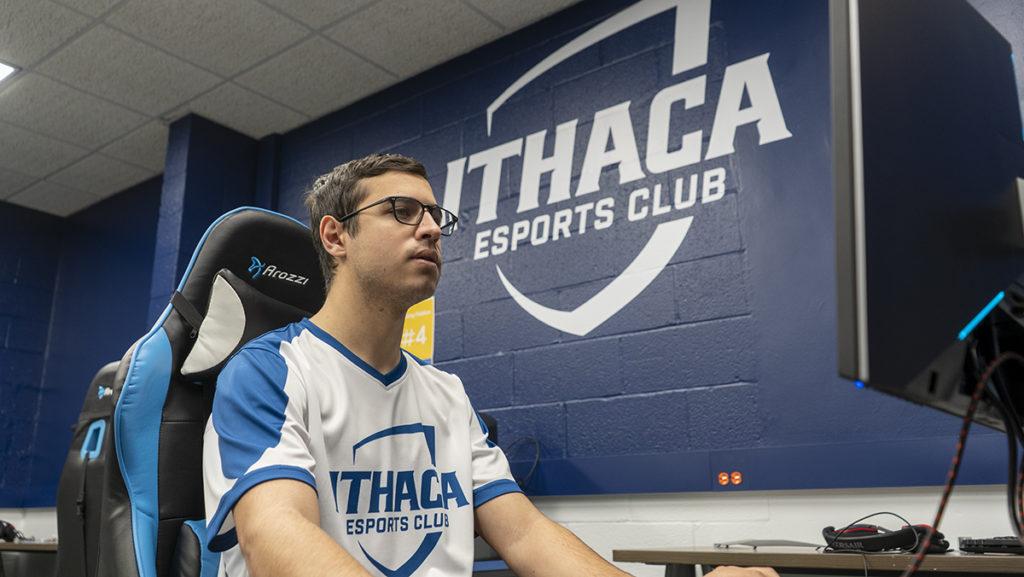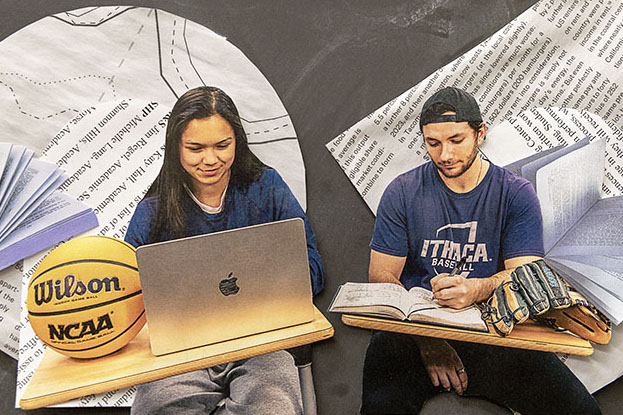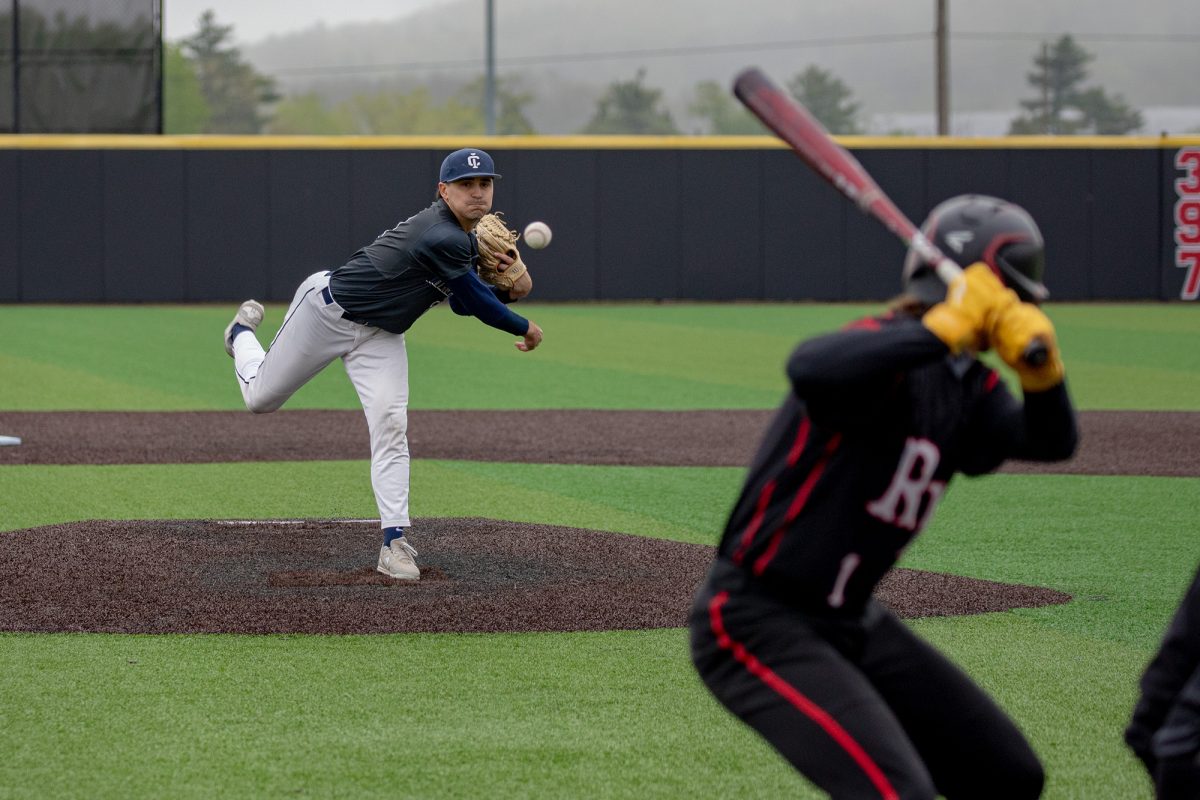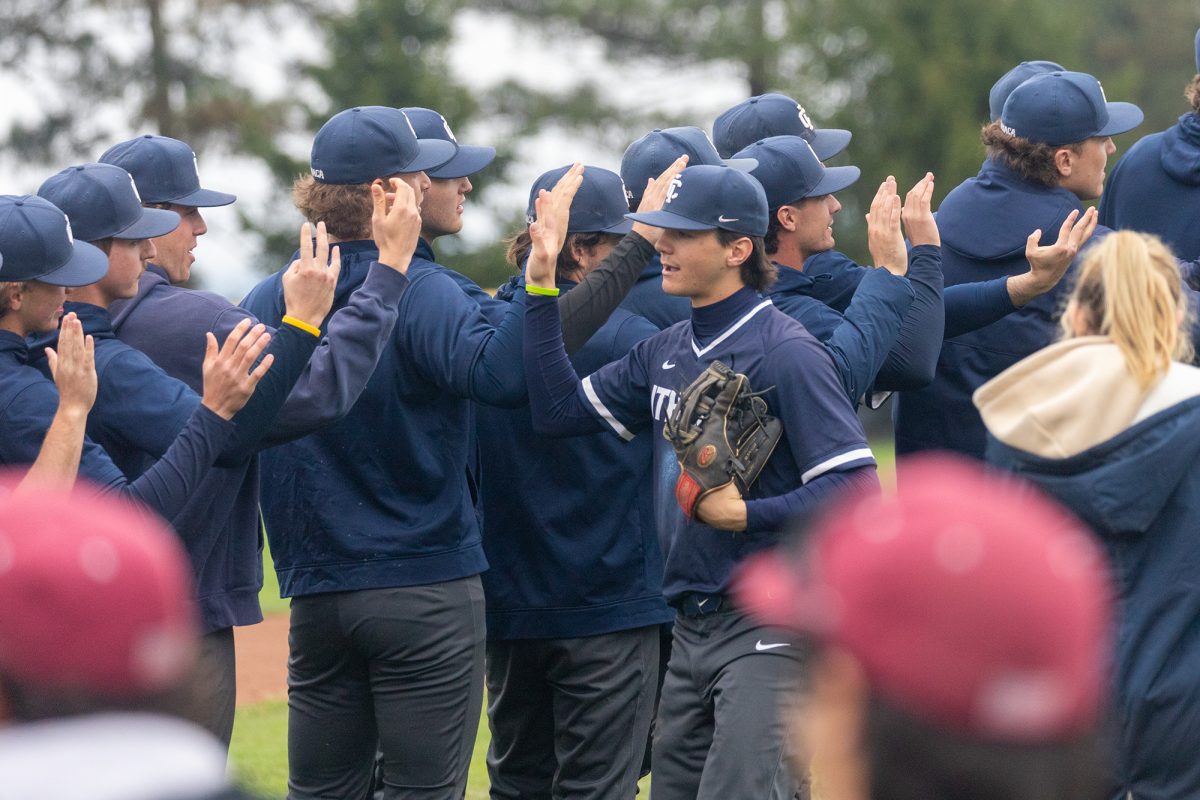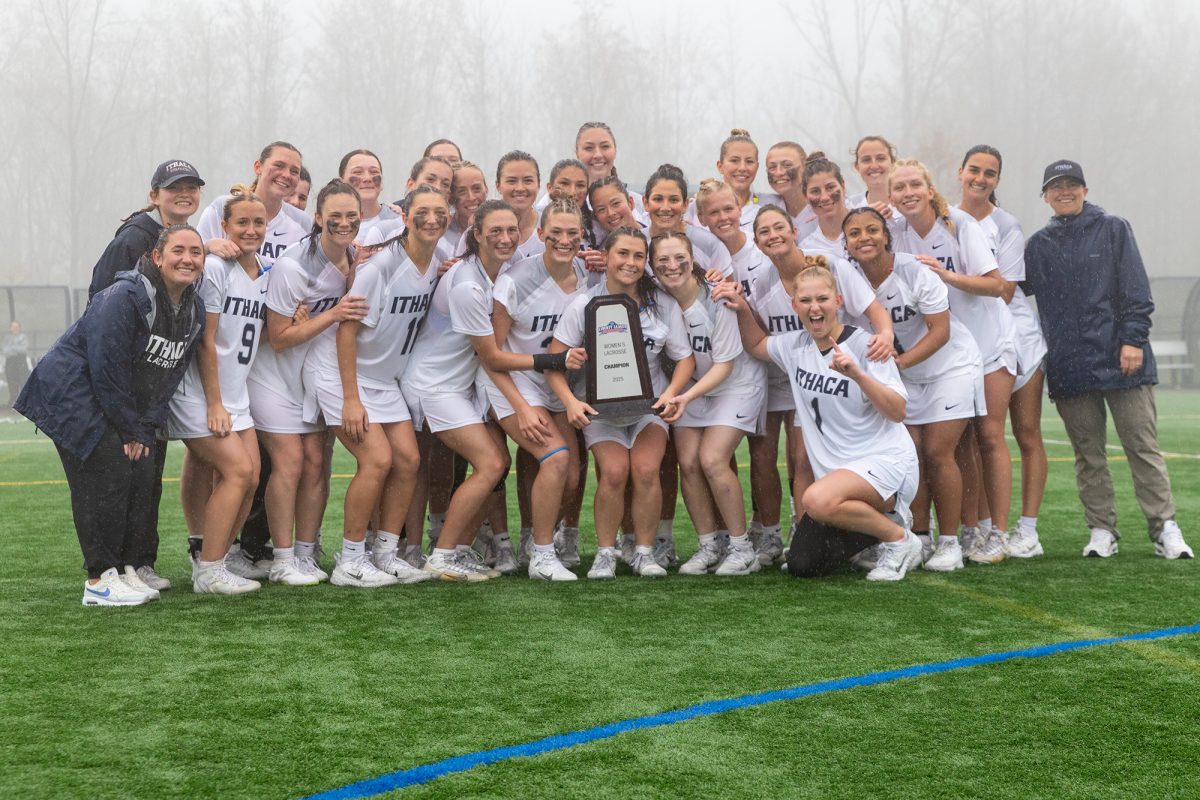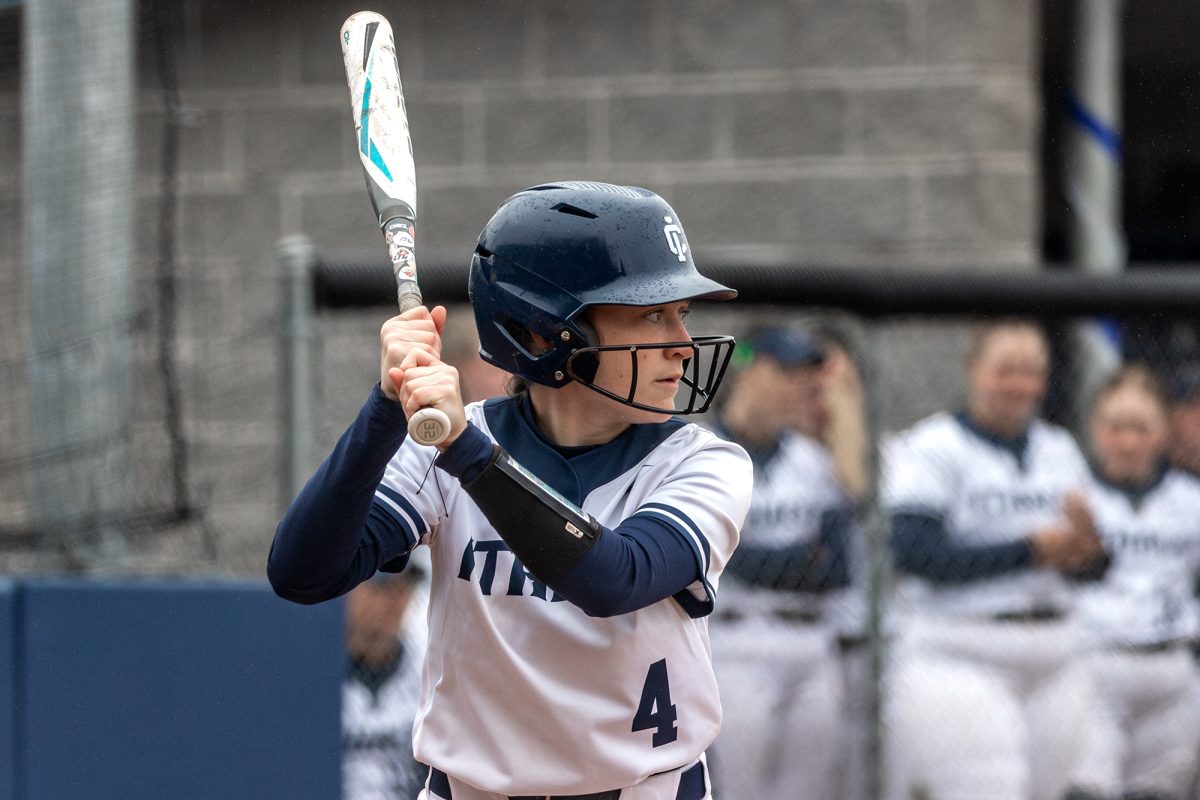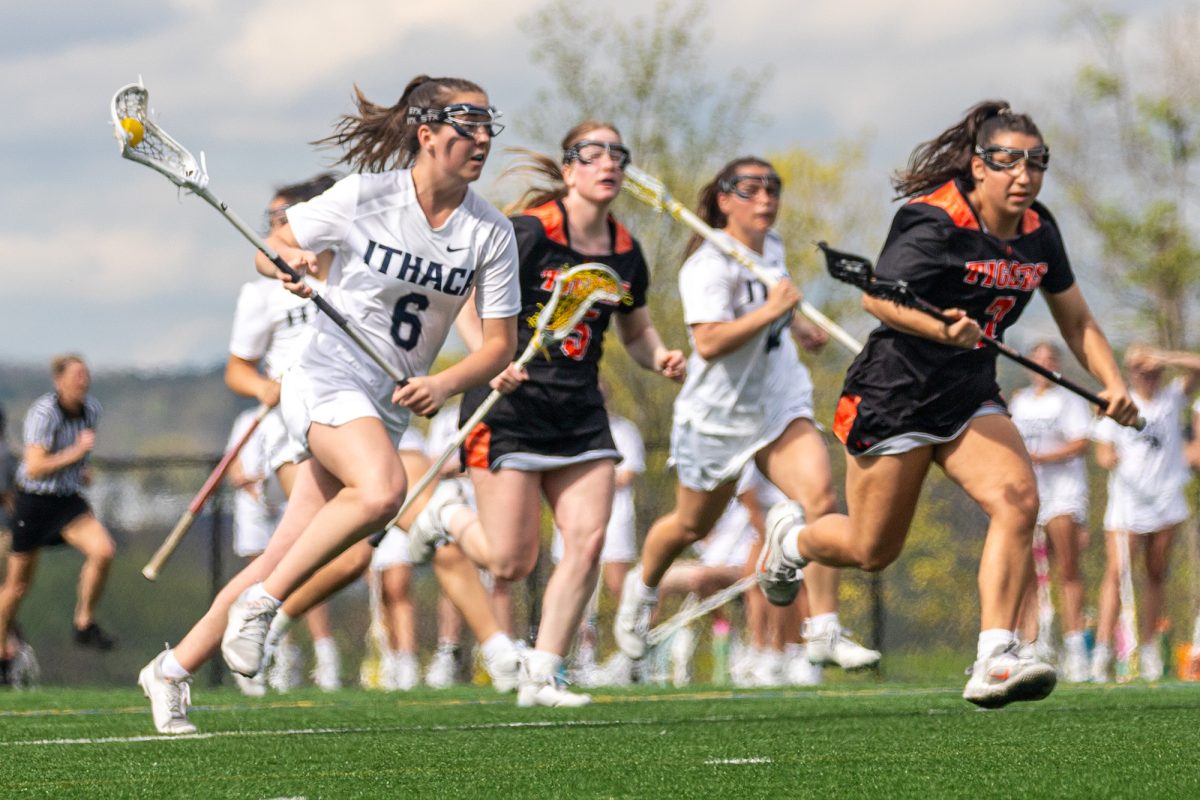When the COVID-19 pandemic began, the esports team gained popularity, as it was able to showcase its games on the show “Bombers Live” on ICTV. Senior Manny Sanchez, who was the lead captain, was also one of the main coordinators and producers of the show and put together a team that he thought could last for many years to come.
“We did Bombers Live Esports through the [Roy H.] Park School [of Communications] and it was immensely successful as we partnered with [the Eastern College Athletic Conference (ECAC)],” Sanchez said. “We were the official broadcast for their playoffs and finals and we were runner-ups for best esports coverage.”
The success of the show was undoubtable, also earning third place for the CBI Award — a national award for college sports coverage. But these broadcasts ended when competition resumed for the college’s football team in 2021.
Founded in 2019, the Ithaca College Esports Club appeals to casual gamers who just want to have fun with friends in weekly local events, as well as competitive gamers who enjoy the thrill of tournaments. The competitive esports team is divided into two teams. IC Blue, made up of five players, plays in the ECAC, one of the largest esports leagues in the country at the collegiate level. The other team is IC Gold, made up of eight players, which is a part of the NECC, a lower-level gaming league. Both leagues play the game League of Legends against other colleges around the country in their given divisions. IC Blue plays in the respective Eastern Conference, a partner conference of the larger ECAC organization. The team placed second out of 75 other programs in the area in its first two seasons of play.
Sanchez, who is captain of IC Blue, said he and the club were frustrated with the lack of support from the college and believed that it was unfortunate the team could not have carried the momentum into this year.
“The college in the past said ‘Oh, we want to have an esports program,’ but they really have not put their money where their mouth is,” Sanchez said. “The advantage that our school has over other schools is we have an award-winning student media, but unfortunately the college does not seem to be interested in going in that direction.”
Sean Reilley, associate director for Recreational Sports, said he believes that the club should already be seen as an official program, because it is able to compete against varsity-level esports schools across the country. Reilley said he has weekly meetings with the club’s executive board, which encompasses both the casual and competitive branches.
“From my perspective, the esports club teams are official teams,” Reilley said. “They’re still able to compete against other colleges and universities in the ECAC.”
Senior Tenzin Namgyel, teammate and friend of Sanchez, said he wishes that at least administration could have offered an official manager and coach who could run the scheduling for the esports team, as opposed to many varsity esports teams it plays against. He believes it would have made the students’ job a bit easier the last couple of years, especially since the team members have busy class and work schedules.
This past year has also taken a strain on senior Jared Anderson, an IC Gold player. Anderson said that by not having a coach or manager and busy senior schedule has made finding times to meet online together as a team incredibly difficult.
“Finding a consistent time for everyone to work when it’s not consistent time each week is sometimes really complicated,” Anderson said. “Obviously, everyone does lots of stuff.”
Additionally, reserving time in the competitive team’s specific practice room in Friends Hall has been a struggle. Time difficulties with teammates and other events made it difficult to practice in person as a team, with the players using Discord from their own spaces, which Sanchez believes put the group at a disadvantage compared to premier collegiate esports programs across the country. This meant the club did not practice much during the semester, and mostly met online.
“We didn’t have access to our practice facility for most of the year, if not all of this year,” Sanchez said. “It is something we had last year during the height of COVID.”
Sanchez said he also believes that the club deserves better after the amount of extra time and effort everyone has put into creating a student-run program from nothing. He believes the college’s administration is making a mistake for not prioritizing an esports program, especially since the gaming industry is only getting bigger in colleges across the country. While the college does not recognize the esports club as a varsity sport, there are 175 colleges and universities in the United States that are a part of the National Association of Collegiate Esports.
“We created, from the ground-up, a nationally-recognized broadcast in year one and we didn’t receive any additional support because of it,” Sanchez said. “I think they’ve almost taken what we did in the first year for granted.”
The club follows the same process as other club sports to receive funding, by submitting formal funding requests, and was one of just two club sports to receive funding for the 2021-22 school year. This year, the club was allocated $1,500 and an additional $1,952 “to cover underfunded purchases” for a total of $3,452, Reilley said via email. Reilley also said via email that the esports club was allocated $1,500 during the 2020-21 academic year, and was the only club sport to receive an allocation during this year. These requests are reviewed by professional staff and the Club Sport Council.
Reilley said he feels like he has focused much of his time into supporting the esports club. He said he believes the esports club has received the most support out of any other club on campus. He also said via email that the group is “the only competitive club sport that does not charge member dues.”
“Over the past three years, more time and resources have been committed to growing the esports club and program than any other club we have,” Reilley said. “They’re being treated the same way that other club sports are because they go through the same recognition process and the same funding request process.”
All members of IC Blue are seniors and three of the eight members of IC Gold are seniors, which raises questions about the future of the competitive side of the program. Without interest and players, Sanchez, Namgyel and Anderson are worried about how the program will be able to succeed when they and their fellow gamers have graduated. While members of the team have thought about recruiting new members, Anderson said the team primarily relies on word–of–mouth and social media to bring people to the club.
“Even if [the administration] had just gone a little further, as in maybe bringing on a facilitator to start the process in the future, because right now, we have no future after we leave,” Namgyel said. “The upcoming students haven’t really been prepared for it and there’s not enough foundation yet for all of us to leave.”
Reilley said he feels like he’s been very involved with the club as a whole and believes that the club is just getting started since esports is on the rise. He expects there to be a successful future with the club.
“The fact that competitive gaming can take place from just about anywhere allowed them [IC Blue and Gold] to continue to grow and actually grow quite rapidly,” Reilley said. “The club itself is definitely in its infancy.”
Sanchez said he is also very concerned about the survival of the club once the founders in the senior class have graduated.
“I’m not certain that the program is going to be able to survive five years,” Sanchez said. “I think it’s going to be really tough for the club to continue to exist at the level that exists.”
However, Anderson believes that there always will be a competitive side of the esports club, but acknowledges that the skill level might not be as high as it was the past couple of years. Just because the senior class is graduating, Anderson still has hope because he knows that there will always be gamers.
“We’ll have to do a bit of recruiting hopefully for next year,” Anderson said. “We just might not be able to play at the same level because we’ve been trying to find more people who are at the higher range.”
Reilley also said he does not anticipate the addition of an official varsity–level esports program added to athletics anytime soon. This would require further considerations and agreements between the athletic administration, the recreational sports committee and the college’s administrations.
“I don’t see that happening in the immediate future because there’s a much larger conversation that needs to happen for a new varsity program to be pushed,” Reilley said. “And ultimately a lot more vetting to take place.”
Susan Bassett ’79, associate vice president and director of the Office of Intercollegiate Athletics, said the department has been impressed with the growth of the esports club and is open to the possibility of working with the team in the future.
“We would certainly consider exciting new opportunities and programs,” Bassett said via email. “The question we have to answer is related to viable competition, funding and staffing needs, and student interest. We are very excited that [esports] has strong interest at Ithaca College. We would have to do additional analysis before determining a time table to elevate the activity to varsity status.”
The future may be unknown for the players of the competitive esports teams, but the club will look to gain more of a presence on campus and continue its success.
“It just was coincidence that all of us decided to go to the school and we’re all decently good at the game,” Namgyel said. “I think esports was totally taking over.”
Clarification: This story only details the college’s two League of Legends teams – IC Blue and IC Gold. The club has a total of five competitive teams, including its Rocket League team, Valorant team, Overwatch team and two League of Legends teams. Additionally, the story states time conflicts among the team members have made it difficult to practice in person at the team’s room in Friends Hall. This has also been a challenge because members of the team did not have key card access to the room and were unable to get in without reservations or during off-hours when team members were available.
Correction: The original version of the story stated that the competitive esports team is divided into two teams of five players, and all but one member of IC Gold are seniors. IC Gold has eight players on its team, and only three are seniors.


